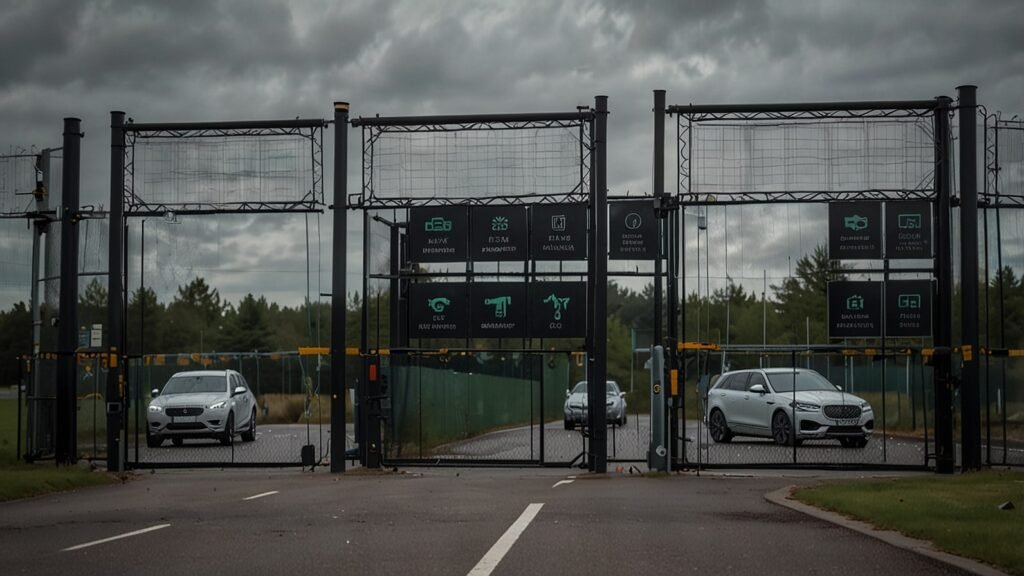
The legendary British car manufacturer Jaguar Land Rover (JLR) has prolonged the closure of its manufacturing facilities in the UK after a sophisticated cyberattack took down its operations, the company reported on September 17, 2025.
The attack, which targeted the key production systems of JLR, has rocked the automotive sector and raised concerns about the vulnerability of global supply chains. As the company scrambles to restore operations at Solihull, Halewood, and Wolverhampton, here’s what’s happening and why it matters.

Hacktivism Paralyses Manufacturing
The cyberattack, detected earlier this week, disrupted JLR’s digital infrastructure and forced a shutdown of production lines responsible for models like the Range Rover, Jaguar F-Pace, and Discovery. Although JLR has not confirmed whether ransomware or a data breach was involved, insiders suggest the attack struck the company’s manufacturing execution systems, which control assembly operations. The result: an immediate halt at major UK facilities.
The Solihull plant, where the Range Rover is built, and the Halewood plant, which produces the Discovery, were among the worst hit. Wolverhampton’s engine facility, critical to JLR’s powertrains, also remains offline. JLR has not given a timeline for full recovery but confirmed it is working around the clock with cybersecurity specialists. Customers awaiting vehicle deliveries are now bracing for extended delays.
Supply Chain and Worker Impact Ripples
The prolonged closure is hitting JLR’s 40,000 UK employees hard, with many facing furloughs or reduced hours. Dealerships are preparing for inventory shortages, a serious blow in the competitive luxury SUV market. As part of Tata Motors of India, JLR is also a key contributor to the UK economy, meaning disruptions are reverberating across suppliers and local communities.
Analysts estimate the financial toll could reach millions of dollars daily, adding further strain to a company already grappling with supply chain issues. The incident highlights how modern auto manufacturing, which relies on just-in-time supply chains and automated systems, has become a prime target for cybercriminals.
JLR’s Response and Industry Implications
JLR has brought in external cybersecurity experts to assess the full scale of the attack and prevent further breaches. The company has notified the UK government, including the National Cyber Security Centre, and is cooperating fully to trace the origins of the attack. While JLR has confirmed no customer data has been compromised, employees and partners have been urged to remain cautious of phishing and other secondary threats.
The wider auto industry is watching closely. As vehicles become increasingly reliant on software from infotainment systems to autonomous driving, cybersecurity is emerging as a critical frontier. The JLR attack may accelerate investment in more resilient digital infrastructure and potentially influence the company’s push into electric vehicles (EVs), where secure systems will be central.
What This Means for JLR Customers
For now, JLR customers face uncertainty. Buyers awaiting deliveries should contact their dealers for updates, while potential customers may encounter limited stock in showrooms. JLR has pledged to honour existing orders, though delays are inevitable until production resumes. A special support line has been made available on the company’s UK website to address customer queries.
The Future of Manufacturing in the Digital Era
This cyberattack serves as a wake-up call for the entire automotive industry. As factories become more digitally interconnected, robust cybersecurity measures are no longer optional; they are essential. JLR’s ongoing battle to restore Solihull, Halewood, and Wolverhampton plants underscores the urgent need for industry-wide security standards.
While JLR fights to recover from what could be the most significant crisis in its modern history, the bigger question remains: can the global auto industry build resilience in an age where digital threats can bring even the most advanced production lines to a standstill? The coming weeks will determine not only JLR’s recovery path but also how the industry adapts to the realities of the digital era.

